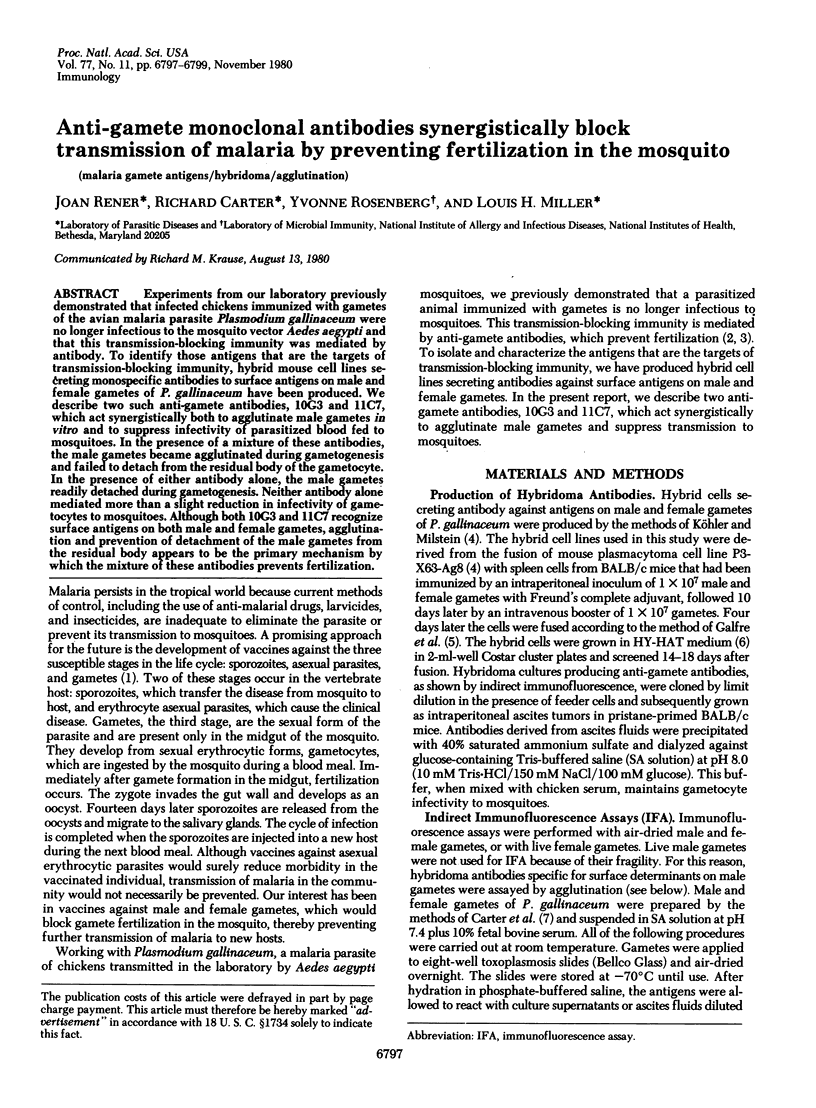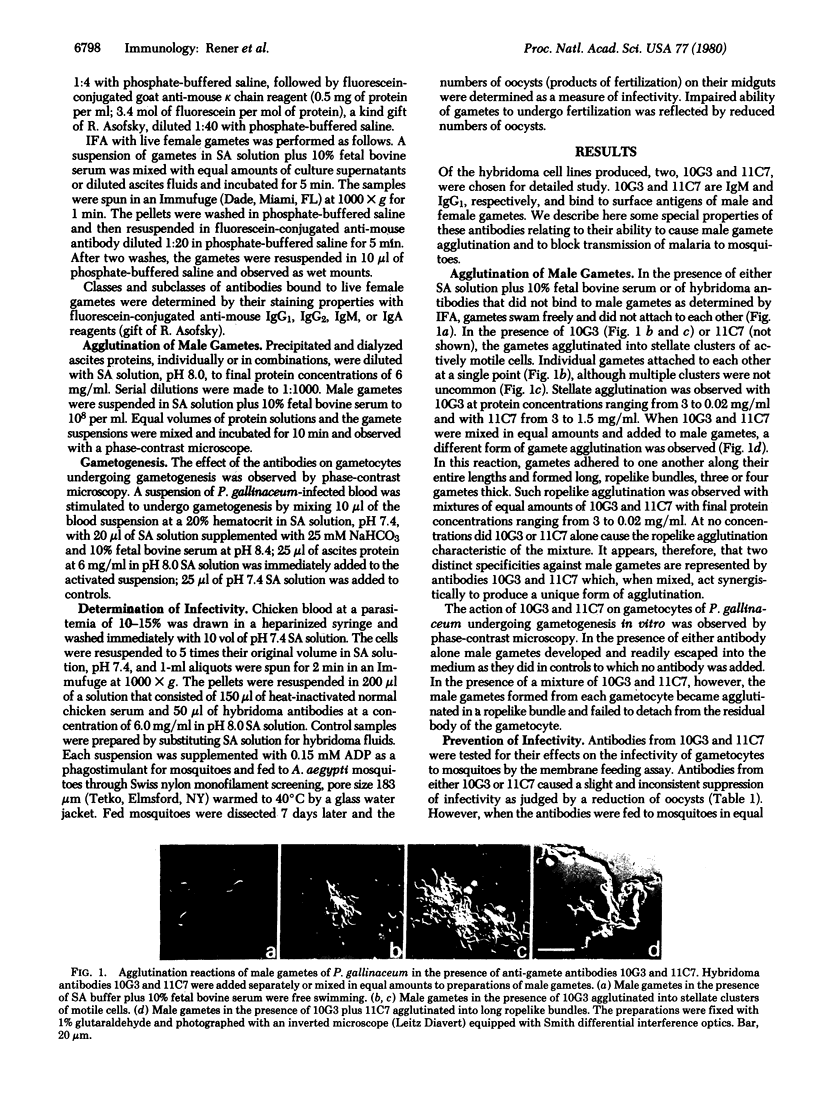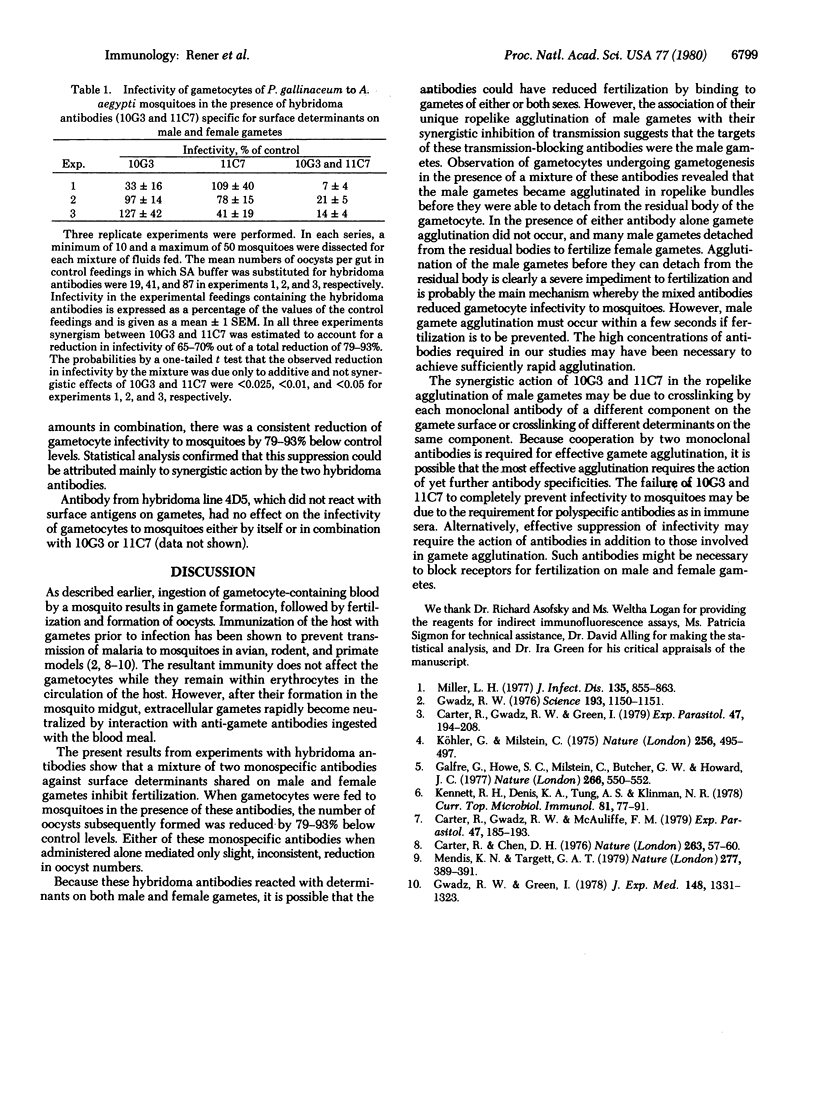Abstract
Experiments from our laboratory previously demonstrated that infected chickens immunized with gametes of the avian malaria parasite Plasmodium gallinaceum were no longer infectious to the mosquito vector Aedes aegypti and that this transmission-blocking immunity was mediated by antibody. To identify those antigens that are the targets of transmission-blocking immunity, hybrid mouse cell lines secreting monospecific antibodies to surface antigens on male and female gametes of P. gallinaceum have been produced. We describe two such anti-gamete antibodies, 10G3 and 11C7, which act synergistically both to agglutinate male gametes in vitro and to suppress infectivity of parasitized blood fed to mosquitoes. In the presence of a mixture of these antibodies, the male gametes became agglutinated during gametogenesis and failed to detach from the residual body of the gametocyte. In the presence of either antibody alone, the male gametes readily detached during gametogenesis. Neither antibody alone mediated more than a slight reduction in infectivity of gametocytes to mosquitoes. Although both 10G3 and 11C7 recognize surface antigens on both male and female gametes, agglutination and prevention of detachment of the male gametes from the residual body appears to be the primary mechanism by which the mixture of these antibodies prevents fertilization.
Full text
PDF


Images in this article
Selected References
These references are in PubMed. This may not be the complete list of references from this article.
- Carter R., Chen D. H. Malaria transmission blocked by immunisation with gametes of the malaria parasite. Nature. 1976 Sep 2;263(5572):57–60. doi: 10.1038/263057a0. [DOI] [PubMed] [Google Scholar]
- Carter R., Gwadz R. W., Green I. Plasmodium gallinaceum: Transmission-blocking immunity in chickens. II. The effect of antigamete antibodies in vitro and in vivo and their elaboration during infection. Exp Parasitol. 1979 Apr;47(2):194–208. doi: 10.1016/0014-4894(79)90073-0. [DOI] [PubMed] [Google Scholar]
- Carter R., Gwadz R. W., McAuliffe F. M. Plasmodium gallinaceum: transmission-blocking immunity in chickens. I. Comparative immunogenicity of gametocyte- and gamete-containing preparations. Exp Parasitol. 1979 Apr;47(2):185–193. doi: 10.1016/0014-4894(79)90072-9. [DOI] [PubMed] [Google Scholar]
- Galfre G., Howe S. C., Milstein C., Butcher G. W., Howard J. C. Antibodies to major histocompatibility antigens produced by hybrid cell lines. Nature. 1977 Apr 7;266(5602):550–552. doi: 10.1038/266550a0. [DOI] [PubMed] [Google Scholar]
- Gwadz R. W., Green I. Malaria immunization in Rhesus monkeys. A vaccine effective against both the sexual and asexual stages of Plasmodium knowlesi. J Exp Med. 1978 Nov 1;148(5):1311–1323. doi: 10.1084/jem.148.5.1311. [DOI] [PMC free article] [PubMed] [Google Scholar]
- Gwadz R. W. Successful immunization against the sexual stages of Plasmodium gallinaceum. Science. 1976 Sep 17;193(4258):1150–1151. doi: 10.1126/science.959832. [DOI] [PubMed] [Google Scholar]
- Kennett R. H., Denis K. A., Tung A. S., Klinman N. R. Hybrid plasmacytoma production: fusions with adult spleen cells, monoclonal spleen fragments, neonatal spleen cells and human spleen cells. Curr Top Microbiol Immunol. 1978;81:77–91. doi: 10.1007/978-3-642-67448-8_13. [DOI] [PubMed] [Google Scholar]
- Köhler G., Milstein C. Continuous cultures of fused cells secreting antibody of predefined specificity. Nature. 1975 Aug 7;256(5517):495–497. doi: 10.1038/256495a0. [DOI] [PubMed] [Google Scholar]
- Mendis K. N., Targett G. A. Immunisation against gametes and asexual erythrocytic stages of a rodent malaria parasite. Nature. 1979 Feb 1;277(5695):389–391. doi: 10.1038/277389a0. [DOI] [PubMed] [Google Scholar]
- Miller L. H. Current prospects and problems for a malaria vaccine. J Infect Dis. 1977 May;135(5):855–864. doi: 10.1093/infdis/135.5.855. [DOI] [PubMed] [Google Scholar]




